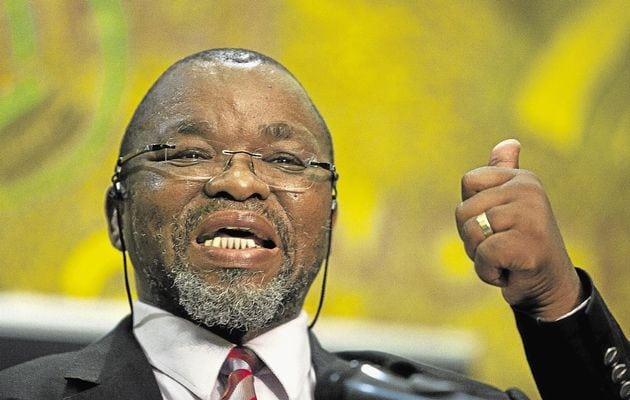
SOUTH Africa’s mining exploration industry received a massive shot in the arm after the country’s mines minister, Gwede Mantashe, said there were no empowerment ownership targets in the newly gazetted Mining Charter order to qualify for prospecting licences.
“Why should we put a target on prospecting?,” Mantashe said at the Joburg Indaba mining conference held in Johannesburg today. “You are looking. Once you discover [something] the BEE [black economic empowerment] requirement must kick in,” he said. This was a reference to the targets as set down in terms of a mining licence application which asks for empowerment of some 30%, up from the 26% target in existing mining licences.
The Mining Charter was not definitive on applications for prospecting licences which either suggested ownership targets would have to be negotiated during the 60 days set aside for the guidelines discussion or, in a best case scenario, there were no targets at all.
Mantashe’s comments, following a keynote speech at the Joburg Indaba conference that was frequently applauded by conference delegates, add another layer of certainty to South Africa’s regulatory dispensation. The conciliatory tone he struck was also a far cry from conditions a year ago in which the Minerals Council CEO, Roger Baxter, boycotted the event in protest of then mines minister’s Mosebenzi Zwane.
“What a difference a year makes,” said Baxter today who added that the Mining Charter was a significant “step in the right direction”. He said the task now was to ensure South Africa delivered on its top quartile rating in the Fraser Institute’s study in terms of having the most mineral potential were its governance stable.
“South Africa’s comprises only 1% of global exploration. That should be 5%. We need to get domestic and foreign venture capitalists back in South Africa; that is key,” said Baxter. About 5% of global exploration was spent in Africa compared to about 17% in Canada.
STATE-OWNED MINING COMPANY
On the sidelines of the conference, Mantashe responded to questions regarding state participation in mining to which he has recently alluded. One is for a sovereign wealth fund which Mantashe said should become involved in identifying mineral resources of its own.
“A Sovereign Wealth Fund works everywhere in the world. Let’s take it forward carefully and structure it properly,” he said. “The Council for Geoscience must start to drill for itself. It must then note the quality of a deposit [it has drilled] and then when we negotiate so we can ask for 65% [in private sector negotiation]. That is a debate that is ongoing,” he said.
Asked about the state-owned mining company, known as the African Exploration & Mining Finance Company (AEMFC), Mantashe said it was critical the company was not located in his Department of Mineral Resources (DMR). “We cannot have it in the DMR because we are the referee and it is competing in the industry,” he said.
The South African government has long planned to move the AEMFC from the Central Energy Fund in the Department of Energy to the DMR. Under the administration for former president, Jacob Zuma, there was talk of a State Owned Mining Company bill which proposed relocating the AEMFC which currently operates a coal mine supplying Eskom. There were also proposals to merge the AMEFC with Alexkor, the government-owned diamond company operating on the West coast of South Africa.
“It mustn’t be in our department,” said Mantashe of AEMFC. “It needs to be put into the Department of Public Enterprises or the Department of Trade,” he said.










